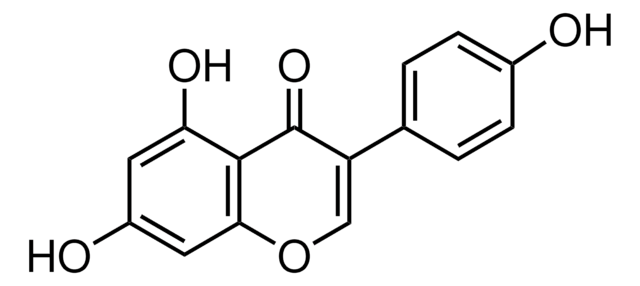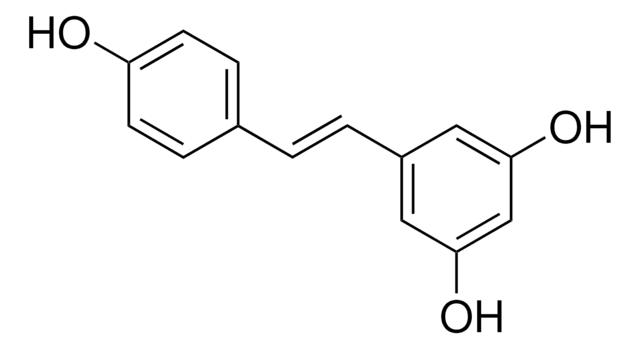SML1876
PaPE-1
≥98% (HPLC)
Sinónimos:
(S)-5-(4-Hydroxy-3,5-dimethyl-phenyl)-indan-1-ol
Iniciar sesiónpara Ver la Fijación de precios por contrato y de la organización
About This Item
Fórmula empírica (notación de Hill):
C17H18O2
Número de CAS:
Peso molecular:
254.32
Número MDL:
Código UNSPSC:
51111800
NACRES:
NA.77
Productos recomendados
Nivel de calidad
Análisis
≥98% (HPLC)
formulario
powder
color
white to beige
solubilidad
DMSO: 25 mg/mL, clear
temp. de almacenamiento
2-8°C
cadena SMILES
O[C@H]1CCC2=C1C=CC(C3=CC(C)=C(O)C(C)=C3)=C2
Acciones bioquímicas o fisiológicas
PaPE-1 is a "Pathway Preferential Estrogen" that activates the extranuclear signaling pathway without activating the nuclear signaling pathway. PaPE-1 bound 50,000-fold less well to ERα and Erβ estrogen receptors. PaPE-1 activated extranuclear-initiated ER-regulated genes, but showed essentially no activation of nuclear-initiated estrogen receptor (ER) gene targets such as the progesterone receptor. Unlike estradiol (E2), PaPE-1 did not stimulate proliferation of MCF-7 breast cancer cells. Like estradiol, PaPE-1 strongly activated MAPK and mTOR pathway. Instead, it showed preferential estrogen-like activity in non-reproductive (metabolic and vascular) tissues, reducing body weight gain and fat accumulation in ovariectomized mice and accelerating repair of endothelial damage in the vascualture.
Palabra de señalización
Warning
Frases de peligro
Consejos de prudencia
Clasificaciones de peligro
Eye Irrit. 2 - Skin Irrit. 2
Código de clase de almacenamiento
11 - Combustible Solids
Clase de riesgo para el agua (WGK)
WGK 3
Certificados de análisis (COA)
Busque Certificados de análisis (COA) introduciendo el número de lote del producto. Los números de lote se encuentran en la etiqueta del producto después de las palabras «Lot» o «Batch»
¿Ya tiene este producto?
Encuentre la documentación para los productos que ha comprado recientemente en la Biblioteca de documentos.
Zeynep Madak-Erdogan et al.
Science signaling, 9(429), ra53-ra53 (2016-05-26)
There is great medical need for estrogens with favorable pharmacological profiles that support desirable activities for menopausal women, such as metabolic and vascular protection, but that lack stimulatory activities on the breast and uterus. We report the development of structurally
Laura Marroqui et al.
Chemosphere, 265, 129051-129051 (2020-12-01)
Bisphenol-S (BPS) and Bisphenol-F (BPF) are current Bisphenol-A (BPA) substitutes. Here we used pancreatic β-cells from wild type (WT) and estrogen receptor β (ERβ) knockout (BERKO) mice to investigate the effects of BPS and BPF on insulin secretion, and the
Nuestro equipo de científicos tiene experiencia en todas las áreas de investigación: Ciencias de la vida, Ciencia de los materiales, Síntesis química, Cromatografía, Analítica y muchas otras.
Póngase en contacto con el Servicio técnico








